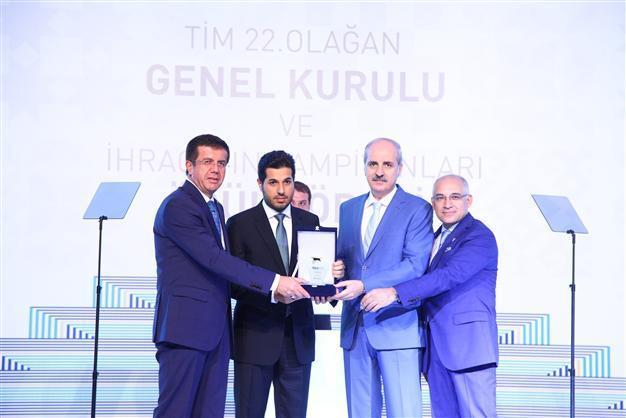Key graft figure’s way to ‘export glory’ paved over years
Sefer Levent - ISTANBUL

CİHAN photo
Reza Zarrab’s road to export glory, recently recognized in a controversial award ceremony, was paved by a series of smart maneuvers designed to sidestep U.S.-led sanctions on Iran.The June 21 ceremony to mark Turkey’s “export champions” saw Zarrab, involved in the huge corruption scandal that embroiled a number of prominent figures in December 2013 before they were cleared at court, receiving an award for the performance of one of his companies from two leading government figures. The company, Volgam Gıda, was awarded as “Turkey’s top jewelry exporter in 2014,” marking a rapid rise for Zarrab whose company did not even feature in the top 1,000 exporters list in the previous year.
According to sources, this “success” story should be examined in four historical periods.
Zarrab’s rise began when Western sanctions were imposed on Iran due to the country’s nuclear program. The U.S. granted some exemptions to Turkey, which needs to buy gas and oil from Iran to meet its huge energy demand.
In line with these exemptions, a bank account was opened in Turkey’s Halkbank in the name of Iran and Turkey was expected to pay for Iranian oil and gas through this account. Iran was also expected to withdraw a pre-defined amount of this money annually.
Analysts say this system worked very well for a while, but problems arose when other countries, including India, started paying Iran for other items through this account. In short, Halkbank mediated the importation of Iranian oil for Turkish oil refinery Tüpraş and a number of Indian companies, with the permission of several international organizations. The U.S. Senate, however, subsequently issued a ruling that allowed sanctions to be extended to financial institutions that do business with the Iranian Central Bank.
In April 2013, daily Hürriyet’s Washington correspondent Tolga Tanış reported that a signature campaign against Turkey had been launched in the U.S. Congress upon claims about the rise in its trade with Iran through Halkbank. Some 47 U.S. deputies supported the campaign and sent a letter to U.S. Secretary of State John Kerry and Treasury Secretary Jack Lew.
The deputies asked for “the inclusion of Halkbank’s transactions transferring gold to Iran into the sanctions list.” It is this use of the “gold transfer” expression in the letter that reportedly paved the way for Zarrab’s company to become a top jewelry exporter.
Payment system changed
According to claims, Zarrab and other businesspeople came onto the scene as a new formula was found after the “money” sent though Halkbank to Iran was put under more scrutiny. These figures were expected to carry out exchanges by sending goods to Iran, rather than money.
Iran was unable to withdraw all of its oil and gas money due to the sanctions, but the new system made it possible for Tehran to be paid easily cashable goods.
It has also been claimed that some of the money in the Halkbank account was transferred to Zarrab and other mediators. They then used this money to buy goods from third parties and send them to Iran. Zarrab initially sent some of the money in Halkbank in the form of gold plates, but when the transfer of gold to Iran was banned a number of processed gold forms, such as bracelets, came onto the scene. This is the route that Zarrab’s company Volgam Gıda took to become a sanctions-busting “export champion.”
The company exported jewelry worth more than $847 million to Iran in 2014, a steep rise from Turkey’s previously very low jewelry exports. As a result, Volgam Gıda became Turkey’s 13th biggest exporter overall in 2014.
















